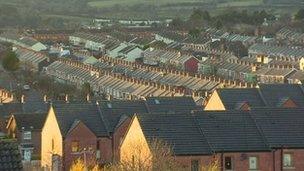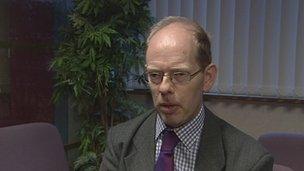PwC: NI house prices may take decade to recover from crash
- Published

Dr Birnie said it could be 2025 before NI house prices return to the level seen before the 2007 crash
It may take more than a decade for Northern Ireland houses prices to recover from the crash, the consultancy firm PwC has warned.
Its Northern Ireland chief economist, Dr Esmond Birnie, said it could be 2025 before prices again reach 2007 levels.
His analysis comes as another house price survey has suggested the troubled NI housing market is stabilising.
The University of Ulster survey showed prices fell very slightly in the second quarter of 2013, compared to the first.
The university's Quarterly House Price Index survey examined 1,409 housing transactions.
Market momentum
It showed an average price of £130,864, compared to £131,128 in the previous quarter.
Figures published on Tuesday by Office for National Statistics (ONS) suggested that prices fell by 0.4% in the year to June giving an average price of £130,000.
Nearly three-quarters of the University of Ulster sample sold at or below £150,000, while 41% of properties sold at or below £100,000.
The authors of the University of Ulster report said these lower price bands are important in providing potential first-time buyers with a range of affordable housing.
They added: "The sustained improvement in the volume of transactions in the survey indicates momentum in the market.
"Although the overall average price is virtually unchanged over the quarter, the stabilisation of price levels has - according to estate agents - led to an increase in first-time buyer activity."
Income squeeze

Dr Birnie said the wider Northern Ireland economy is showing signs of recovery
Dr Birnie said that while some types of property in popular areas are demonstrating real recovery, prices have "some way to go before they are clearly on the turn".
He added that a squeeze on disposable incomes could continue to act as a brake on the market.
He said it could be 2025 before prices again reach 2007 levels.
"It will take that amount of time based on what is likely to happen at the UK-wide level, where various projections have been made for house prices," he said.
"It's got to be remembered there was a tremendous decline of the order of 50% from the peak in the summer of 2007, so it's not surprising it will take a considerable length of time to get back to where they were at their peak."
PwC's economists analysed over a decade of data from the ONS to discover that, since 2009, UK average, real hourly earnings have fallen by 8.5%, but in Northern Ireland, they have fallen by 9.75%.
It means that, allowing for inflation, Northern Ireland average hourly earnings at the start of 2013 were only around two pence more than they were in 2003.
Economic growth
Looking at the wider economy, Dr Birnie said that Northern Ireland is demonstrating signs of recovery.
Manufacturing and construction are reporting increased demand and orders, exports are up and claimant count unemployment has fallen in recent weeks, while redundancies appear to be slowing.
He forecasts economic growth of around 0.5% in 2013, possibly rising to 1.5% in 2014, assuming continued steady recovery in the UK and Republic of Ireland.
- Published13 August 2013
- Published13 August 2013
- Published7 May 2013